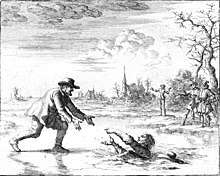Abecedarian
Abecedarians were a 16th-century German sect of Anabaptists who rejected all human learning. Questions have been raised as to the historical accuracy of the name and sect.
| Part of a series on |
| Anabaptism |
|---|
 Dirk Willems (picture) saves his pursuer. This act of mercy led to his recapture, after which he was burned at the stake near Asperen (etching from Jan Luyken in the 1685 edition of Martyrs Mirror |
|
Background |
|
Distinctive doctrines |
|
Largest groups |
|
Related movements |
|
|
Rejection of education
According to the original Catholic Encyclopedia, the Abecedarians were a 16th-century German sect of Anabaptists who affected an absolute disdain for all human knowledge, contending that God would enlighten his elect from within themselves, giving them knowledge of necessary truths by visions and ecstasies, with which human learning would interfere.[1][2]
They rejected every other means of instruction, and claimed that to be saved one must even be ignorant of the first letters of the alphabet; whence their name, A-B-C-darians. They also considered the study of theology as a species of idolatry, and regarded learned men who did any preaching as falsifiers of God's word.[1]
Nicholas Storch led this sect, preaching that the teaching of the Holy Spirit was all that was necessary.[1] Andreas Karlstadt adopted these views, abandoned his title of doctor and became a street porter.
Doubts of accuracy
Early Anabaptists were viewed disdainfully by their adversaries as a radical peasant movement. Thus some consider the extant descriptions to be an elitist caricature of either a particular Anabaptist group or Anabaptists as a whole. Most more recent reference works have ceased to mention the group at all. No equivalent entry was present in the New Catholic Encyclopedia. No historical references later than the early 20th century mention these claims.
Other historical information
John Bell stated their founder's name was Stork, a disciple of Luther, and that "this sect was some time considerable in Germany".[3]
Cultural references
In the graphic novel The Calculus Affair, Captain Haddock uses the word "Abecedarian" as an epithet. Los Angeles Post Punk band Abecedarians named themselves after the sect. They released three albums between 1986 and 1988.
See also
- Chandrakirti, a Buddhist scholar which argued that the Buddha ceased all mental functions upon attaining nirvana
References
- Spofford, Ainsworth Rand; Annandale, Charles (13 November 2018). "A Handy Book of Reference on All Subjects and for All Readers". Gebbie publishing Company, limited – via Google Books.
- Hyamson, Albert Montefiore (13 November 2018). "A dictionary of English phrases; phraseological allusions, catchwords, stereotyped modes of speech and metaphors, nicknames, sobriquets, derivations from personal names, etc., with explanations and thousands of exact references to their sources or early usage". London : Routledge; New York, Dutton. Archived from the original on 1 September 2016. Retrieved 27 January 2019 – via Internet Archive.
- Rev. John Bell, The Wonderings of the Human Intellect, Edward Walker, Newcastle, 1814
External links
| Look up abecedarian in Wiktionary, the free dictionary. |
- Herbermann, Charles, ed. (1913). . Catholic Encyclopedia. New York: Robert Appleton Company.